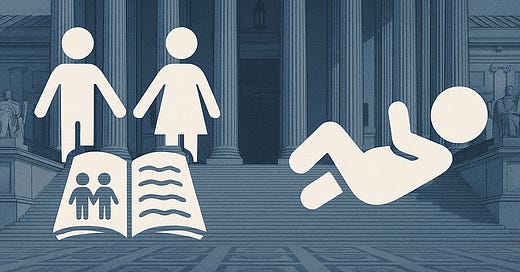June Judgment Day: SCOTUS's Upcoming Rulings
Pivotal Decisions Coming on Trans Rights, Online Censorship, Birthright Citizenship & Public Education
As the U.S. Supreme Court enters the final stretch of its 2024–2025 term, all eyes are on the decisions still to come, a slate of pending cases that could reshape American civil rights, public education, healthcare, and the very definition of citizenship itself.
Each June, the Court releases its most significant rulings, typically each Thursday at 10 a.m. ET. This year, while some procedural decisions have already landed thanks in part to a rare and embarrassing Friday email blunder by the Court that accidentally sent its docket early, the landmark opinions are still pending. They promise to leave an indelible mark on the nation.
We just hit 14,000 subscribers—thank you!
Get exclusive access for just $1/week or $52 a year.
Get exclusive analysis and fearless reporting you won’t find in corporate media.
Trans Rights on Trial: U.S. v. Skrmetti
This case, quietly carrying the weight of an entire movement, could become the judicial high-water mark in the GOP’s campaign against transgender youth. Tennessee argues it has a compelling interest in banning gender-affirming care for minors, including puberty blockers, hormone therapy, and surgeries. The Biden administration countered that these bans violate the 14th Amendment’s Equal Protection Clause, depriving trans youth of medically necessary care based on prejudice.
This isn't just about healthcare. It's about whether trans children have the same constitutional protections as everyone else. There’s no direct precedent here, making the Court’s decision potentially groundbreaking and either deeply protective or devastatingly regressive.
We’ve reported on previous transgender court cases here:
The Internet Isn’t Safe Either: Free Speech Coalition v. Paxton
At first glance, this case appears to be a minor regulatory dispute: Texas passed a law requiring adult websites to verify users’ ages and display government-scripted health warnings. However, at its core, it’s a test of digital privacy and free speech in a climate increasingly hostile to both.
If the Court upholds Texas’s law, it could give states the license to police the internet under the guise of protecting children, opening the door to mass data collection, user tracking, and moralistic censorship. This could affect not just adult websites, but broader content categories from queer creators to sex education platforms.
See our reporting on another Texas effort here:
The Hidden Attack on Obamacare: Kennedy v. Braidwood
The target this time isn’t the ACA as a whole, but the Preventive Services Mandate, the part of Obamacare that ensures free access to things like cancer screenings and PrEP. A conservative Christian business argues that the Task Force responsible for these mandates was unconstitutionally appointed, making its directives invalid.
It’s a surgical attack — legal, procedural, but potentially devastating. If the Court sides with the plaintiffs, the ripple effect could leave millions without access to basic preventive care. It would also set a precedent for dismantling other federal agencies and health protections on similar technical grounds.
The changes to federal public health have been a common topic in the Coffman Chroncile. In addition to attacks on affordable care, there are also many attacks on truth, science, and medicine. See our reporting here:
Note: This article is more than 45 days old and now lives in our archive. Consider becoming a paid subscriber for the full 600+ article archive, exclusive content, and occasional early access.
A Battle Over Books: Mahmoud v. Taylor
In Maryland, a group of parents wants to opt their children out of reading LGBTQ-inclusive books in school, citing religious objections. The district said no, and now the case has been appealed to the Supreme Court.
This is more than a local curriculum dispute. If the Court rules in favor of the parents, it could open the floodgates for religious opt-outs from any content that doesn’t align with conservative beliefs, effectively fracturing the secular foundation of public education.
This case could reshape how schools approach inclusion, diversity, and the line between parental rights and public accountability.
We’ve reported extensively on education, book bans, DEI, and libraries. See some of our reporting here:
Note: This article is more than 45 days old and now lives in the archive. Consider becoming a paid subscriber for the entire 600+ article archive, exclusive content, and occasional early access.
The Constitution on Trial: Birthright Citizenship and the Fight Over Who Belongs
In January, President Trump issued an executive order attempting to end automatic citizenship for children born to undocumented immigrants. Multiple federal courts immediately blocked it as unconstitutional. However, the Supreme Court is now weighing whether lower courts can issue nationwide injunctions to halt such executive overreach.
The Court hasn’t yet taken up the substance of birthright citizenship. However, by deciding who can halt the enforcement of unlawful orders, it lays the groundwork for how a future administration might challenge the 14th Amendment without technically rewriting it.
Justice Ketanji Brown Jackson called the administration’s stance a game of “catch me if you can,” warning that limiting judicial power would allow rights violations to take root before courts can stop them.
If the Court rules that nationwide injunctions are too broad, Trump’s order could take effect in parts of the country, setting up a patchwork of citizenship and preparing the terrain for a full constitutional fight in a future term.
See our previous reporting here:
The Big Picture: What’s at Stake?
Together, these cases pose fundamental questions about who counts, who decides, and who is entitled to participate fully in American life.
Will trans youth be protected or criminalized?
Will your internet be private or monitored?
Will your healthcare remain accessible or fall to procedural sabotage?
Will your child’s education include diverse voices, or only those approved by conservative activists?
Will your place of birth guarantee your citizenship, or depend on your parents’ papers?
These are not fringe cases. They are the legal frontlines of the nation’s ideological divide.
What’s Next?
Next opinion drop: Thursday, June 13 at 10 a.m. ET
Additional decisions are expected each Thursday through late June or early July
The Court will recess for the summer in early July and return for the next term on October 6, 2025
Justices begin meeting behind closed doors on September 29 to review the next wave of cases
Final Thought
The quiet drama of June is anything but quiet for the people whose lives hang in the balance. We’ll be here, watching, analyzing, and breaking it all down because these aren’t just decisions. They’re declarations of who we are as a country.
Stay tuned. Stay ready. Stay loud.
We just hit 14,000 subscribers—thank you!
Get exclusive access for just $1/week or $52 a year.
Get exclusive analysis and fearless reporting you won’t find in corporate media.
Bibliography:
“A Pregnant Cuban Emigre Worries About Her Baby's Citizenship as Supreme Court Weighs a Trump Order.” Associated Press, May 2025.
Millhiser, Ian. “A Federal Judge Already Blocked Trump’s Single Most Unconstitutional Action.” Vox, May 2025.
“US Supreme Court to Shortly Commence Hearing on US Birthright Citizenship.” Times of India, May 15, 2025.
“Supreme Court to Hear Religious Freedom Case Involving LGBTQ+ Storybooks in Schools.” The Washington Post, April 20, 2025.
Marimow, Ann E. “Justices Appear Likely to Uphold Tennessee Ban on Treatments for Trans Teens.” The Washington Post, December 4, 2024.
Walsh, Mark. “Supreme Court Faces Big Test on Religious Students’ Opt‑Outs From LGBTQ+ Books.” Education Week, April 17, 2025.
“How Justices Seemed Poised to Back Religious Opt‑Outs for LGBTQ Storybooks.” The Washington Post, April 22, 2025.
“Free Speech Coalition v. Paxton.” Wikipedia, March 2025.
“Adult Entertainment Industry Sues Over Law Requiring Pornographic Sites to Verify Users' Ages.” Associated Press, 2024.
Paúl, María Luisa. “DOJ Challenges Tennessee Over Ban on Gender‑Affirming Care for Minors.” The Washington Post, April 28, 2023.














The GQP is fine with letting innocent men, women and especially children die. Full stop.